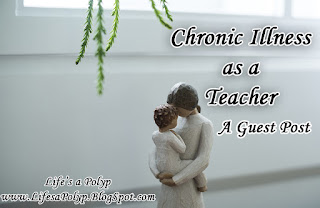I'm sitting in an Ear, Nose, and Throat doctor's office waiting to get a thyroid biopsy. Familial Adenomatous Polyposis (FAP) is a scary disease, it takes so much away from me and my family.
I was asked about what I've taught my children about my health and health issues. I pondered this question more as I sat in that ENT office, waiting again for a test which results may change my life again. How do you tell your children you have a deadly disease? How do you explain to your kids once again why you can't walk through the zoo, today you can't jump rope or play soccer in the yard, why you can't eat their favorite food, why you can't do so much that every parent should be able to do?
I don't tell them everything at once, I break it down, and I don't give the doom and gloom tidbits that crawl through my mind weekly (if I'm lucky).
Before sharing how I tell my kids about my disease, I need to explain a little about my family. We're different. First, we adopted both of our children, Jeremiah is 5 and Payton is 7. Because of adoption my children won't inherit my disease, which I'm extremely grateful for. If my children were to inherit my disease I would make different considerations when educating them, so for this post I'm coming from a different angle than some who will read this.
Another factor that makes our family different is our son, Jeremiah, has autism. He doesn't understand my illness and wouldn't if I explained it to him so for this post I will only be talking about my daughter, Payton, and how I've shared with her about my disease and how she's dealt with it.
I had my colon removed when I was 18 years old (I'm now 36). The removal of such a large organ has caused some issues for me and thus we've talked to Payton a lot about the result of not having a large intestine. (I say 'we' because my husband is very supportive and helps to share with Payton about what I can and cannot do, why my body is the way it is.) This has led to discussions about my disease.
I tell Payton that I've had my large intestine removed because if I hadn't, I would have cancer. I haven't really explained what cancer is to her because I feel it would cause her to worry too much. She knows her great-grandma died of cancer (different from what I face because this grandma didn't have FAP) and Payton's intelligent so I'm sure in some way she's connected some dots. Frankly, she probably avoids asking too much because she knows the end results of the word 'cancer'.
When I get tests done, she knows about them and knows what they're for. Although she doesn't know the scope of everything, she's aware that mommy has a disease and life is different because of it.
We try not to make life too different, but having this disease and adding a child who has nonverbal autism, life is going to be unique. We try to make it as normal as possible. We are very family-focused and we try to tailor our adventures to fit everyone's abilities.
I've also really focused on getting all I can out of my good days. I only have so much each day and there are days when I don't have anything at all - I'm exhausted and in pain. On the good days I try to spend quality time with my kids. I take them often to hug, hold them, and do any activity with them they enjoy.
Overall, Payton is empathetic to how I feel but there are times when she gets tired of not being able to do something because I'm sick or because I'm sleeping. There are many times I feel guilty because I have this disease, mainly because of how it's affected me. I get so frustrated and a large part of that frustration is around what I can't do with, or for, my family.
So, how do you tell your child about your serious rare disease? It's hard, I don't know that there's a simple way to go about it, especially when it's a disease that's trying to take your life with every breath you breathe. Cancer conversations are horrible to have with children. I think the best way to go about it is slowly and simply, making terminology as simple as possible and leaving out the catastrophic information as long as you can without shutting your child out completely.
I believe that when a parent has a serious illness it can create a compassionate child. I've seen this in our daughter, but more so because of her brother's autism, and this is probably because it's something we live with daily. Many conversations center around Jeremiah's disABILITY.
Because of living with autism and having open conversations about it, Payton has become an awesome advocate for special needs. She is extremely accepting of people who are different and so loving toward others. She is also very helpful with her brother even when I don't ask a thing of her. She knows. She has an innate ability to understand that I need help with Jeremiah and she goes out of her way constantly to assist him. I think so much of who she is stems from having the family she does (both because of her brother's autism and my illness). We explain and openly talk about so much and we are also very supportive of one another.
The family I grew up in treated this disease far differently and in the end it wasn't the best for me. This disease has killed several of my extended relatives including my Grandma, she passed at age 47 when my mother was 22. My mom saw this disease take her mother in such a horrible, unthinkable way, yet she put it under the covers and didn't face its reality. She didn't have a colonoscopy until she was 39, she's extremely fortunate she didn't have cancer and the doctors were able to remove her colon and she's still alive at age 62.
However, this approach of blanketing it and not facing reality caused me to not see what could happen to me. I lived in a sort of utopia. I knew I needed to get regular colonoscopies but I didn't really understand the full devastation FAP can cause. I skipped those colonoscopies for years, probably due to my mom being fine when she was 39 and not having any other complications. I didn't understand that it's not as simple as removing every polyp. I didn't realize how fast this disease can escalate. There was a lot I didn't know. Open communication and further learning could have helped me know what to watch for.
My mom never wanted to talk about her mother's passing, in fact, it affected her so much that she hardly ever spoke of her mom, even the good times. Her death had wrenched my mothers heart so much that she wasn't even able to talk about her. Because of this I never learned about my Grandma, what she was like, what she loved to do, what her best qualities were. Nor did I really know how FAP had taken her. I didn't need to hear every detail at age 15 but as I saw my 20s passing it was something that should have been talked about. I needed to know what I'm facing.
There are some benefits to me living in that utopia but more information would have been better. For example, there's a good chance I wouldn't have done foster care or adopted a special needs child if I'd known what I know now. However, I'm so glad I did, it's been the best decision I've ever made.
These conversations are difficult and so much more for parents who have children who inherited this disease. Take it one step at a time and know that none of us are going to do it perfectly.
Tracy Dee Whitt authors the blog LovinAdoptin, encouraging and supporting adoptive and foster parents as well as those living with autism. She can be found on Facebook, Twitter, and Pinterest.
















